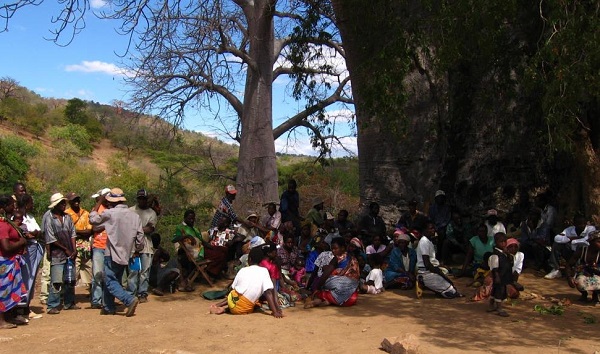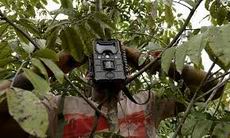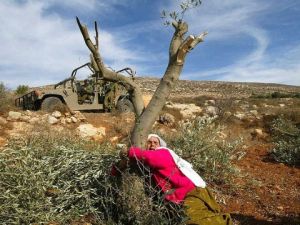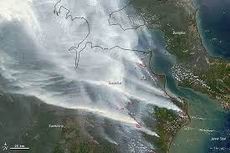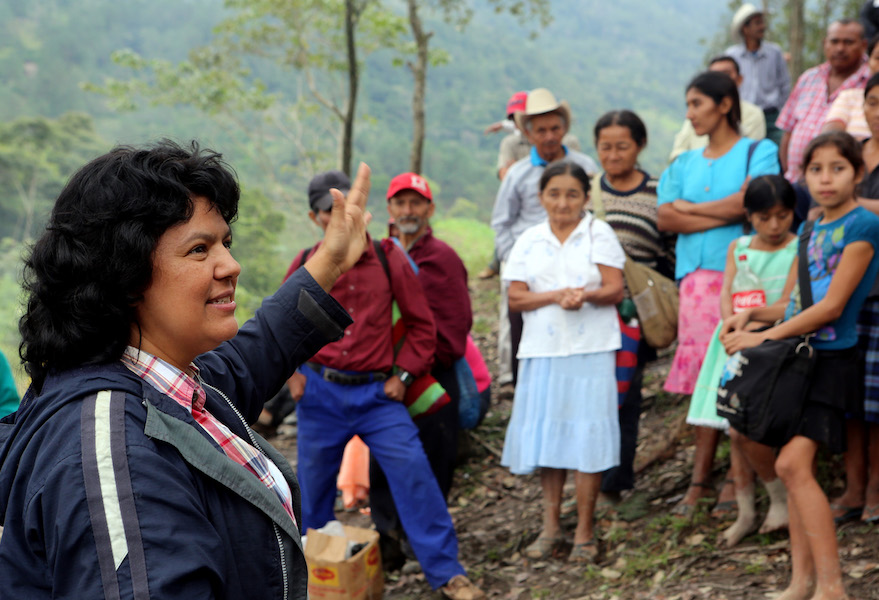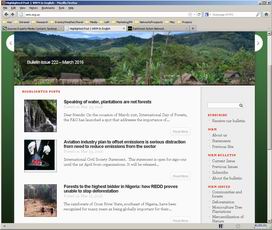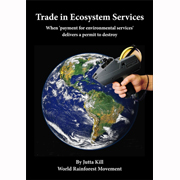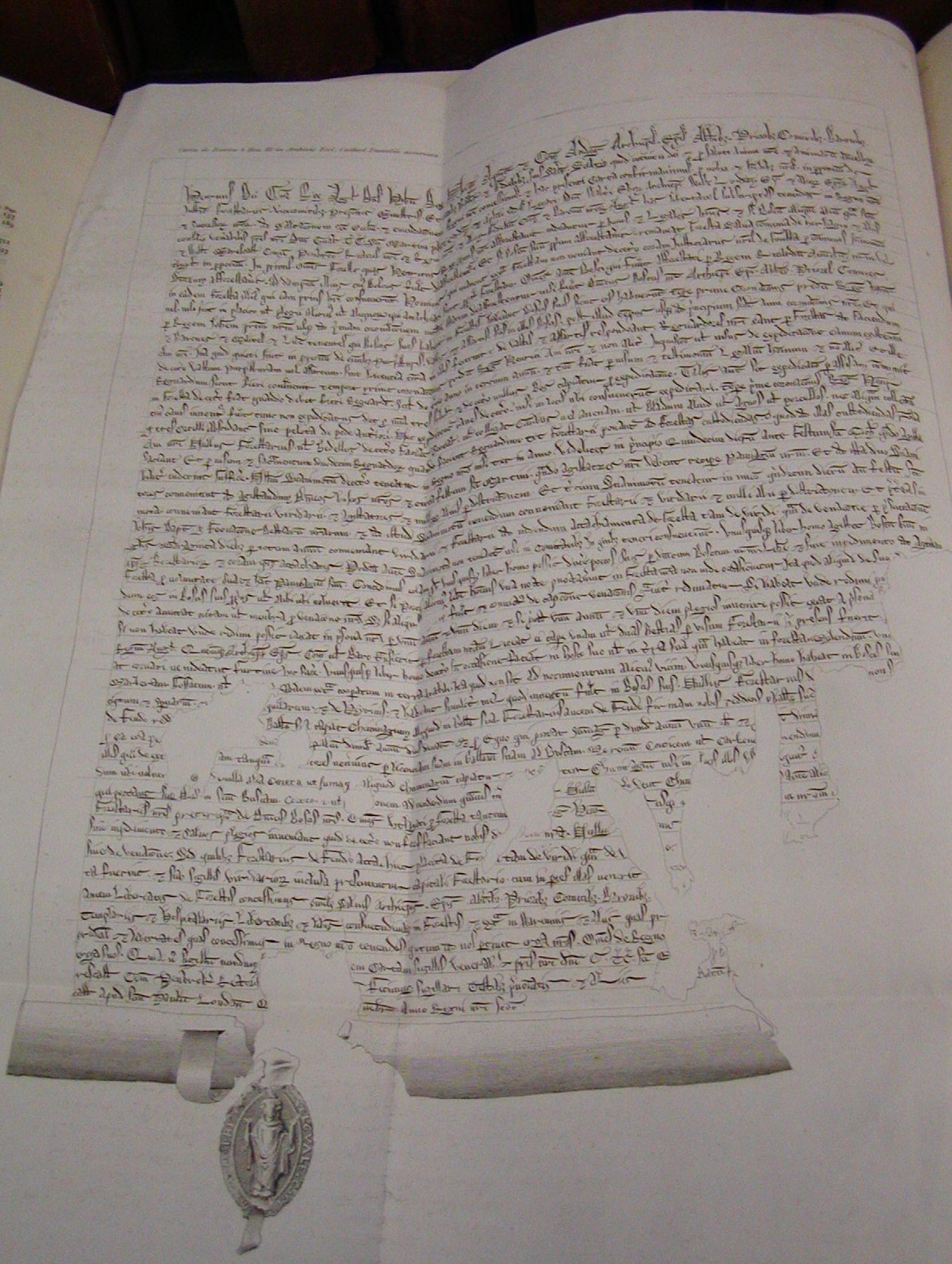Other Voices: The Connexions Newsletter
March 26, 2016
This Issue: The Forests and the Trees
For countless centuries, forests, and the trees in them, have been seen as sources of life, livelihood, and spiritual meaning. For capitalism, however, forests are sites of extraction and profit-making, or obstacles in the way of ‘development.’ In this issue, we look at some of the threats to forests worldwide, and the ways in which people are resisting and defending the forests.
In the Amazon, tribal people are combining traditional skills with direct action and modern technology to fight against illegal logging. In India, villagers are organizing to protect their forests against being flooding by dams. In Palestine, farm families are staying on their land, and planting new trees to replace the ones destroyed by Israeli soldiers and settlers. In Mozambique, farmers and communities are organizing against land takeovers by foreign corporations.
In the Organizing section, we look at the organizing work of Bonnie Phillips, a long-time forest defender.
And in From the Archives, we go all the way back to the year 1217, when an English king yielded to popular pressure and issued the Charter of the Forest, affirming the rights of the common people to use the forests for their livelihoods.
As always, we invite you to share this newsletter with your friends. You can forward this email, or send them the link to the Other Voices home page on the Connexions website at www.connexions.org/Media/CxNewsletter.htm.
If you'd like to subscribe and receive this newsletter by email every two weeks, please use this form.
Your feedback is appreciated - and so are donations to keep us doing what we're doing!

Topic of the Week
Forests and Trees
The Connexions Subject Index features an extensive collection of articles, books, websites, films, and other resources on trees and forests – and movements around the world to protect them from exploitation, clear-cutting, and land seizures.
See Forests and Trees and related topics.
This Week in Connexions.org
Mozambique's Movement to End Land Grabs
To corporations, the forest is only business. To communities, the forest is everything: trees, medicine, culture, spirituality. Land-grabbing and the removal of communities from forests and land breaks the community, displaces access to food and water, and uproots the connection to nature and local knowledge. There is an old saying in Africa: the land doesn’t belong to us; it belongs to our children, and the children of our children. In the past decade, Mozambique has seen a huge increase in land-grabbing and foreign investment in agriculture and natural resources, coupled with pollution and climate change. In Mozambique, farmers and communities are fighting back to protect their land, their forests, and their rights. Read more
Keywords: Forests - Mozambique
Amazon tribe protects the forest with bows, arrows, GPS and camera traps
The authorities who are supposed to protect them are ineffective or corrupt, so the 2,200-strong Ka'apor, in the Brazilian state of Maranhão, are taking on the illegal loggers with technology and direct action. Now the Ka'apor are seeking support through NGOs and the media. Read more
Keywords: Indigenous Struggles - Logging
“No matter how many olive trees they destroy, we will plant more”
In occupied Palestine, many thousands of olive trees have been destroyed by the Israeli military and illegal settlers in an ongoing attempt to force Palestinians to leave their land. Since 1967, the occupiers have destroyed at least 800,000 olive trees. Despite this, Palestinian farmer continue to cultivate their land, and continue to plant new trees. Read more
Keywords: Olive Trees - Palestine/Occupation
Dear sisters: they are killing our trees
People in the Thrissur district of Kerala, India, are fighting to keep their forests in the face of a threatened dam project which would submerge their ancestral lands. Offered financial compensation based on the ‘market value’ of their trees, they reply that they reject this idea of ‘value.’
“We are aware of the true value of trees. For us, all of the Kadars in the 9 settlements in the Vazhachal Athirapally Forest division the trees are part of a large and contiguous rainforest ecosystem. We value them for the coolness we feel as we walk for hours in search of food, fuel and fodder. We know and sense trees through their continuous life process by which water is rejuvenated in the ground and flows out as streams and rivers. We feel the trees in every drop of water that the river carries down feeding and watering the lives of so many downstream Panchayats. We see the strength and generosity of trees in the honey filled flowers and the honey combs that bees make that earn us our livelihood. We sense the nutrient rich humus that leaves shed from trees growing by the river bank that emerges as the diverse fishes and other life forms that reach our hearths. We know trees through the heat and energy of the fire that helps cook our food and warm our tiny huts on cold nights.” Read more
Keywords: Dams - Rainforests
Indonesia is burning: So why is the world looking away?
A great tract of the Earth is on fire. It looks as you might imagine hell to be. The air has turned ochre: visibility in some cities has been reduced to 30 metres. Children are being prepared for evacuation in warships; already some have choked to death. Species are going up in smoke at an untold rate. It is almost certainly the greatest environmental disaster of the 21st Century - so far. It is hard to convey the scale of this inferno, but here’s a comparison that might help: it is currently producing more carbon dioxide than the US economy. In three weeks the fires have released more CO2 than the annual emissions of Germany. And the media? It's talking about the dress the Duchess of Cambridge wore to the James Bond premiere, Donald Trump's idiocy du jour and who got eliminated from the latest episode of Dancing with the Stars. Read more
Keywords: Environmental Crisis - Forest Fires
"They Want to Prohibit Us from Dreaming"
An interview with Honduran environmental and human rights organizer Berta Cáceres, who was murdered on March 3.
She says “We dream of a Honduras in which we have the right to be happy. It’s the most insurrectionary, most subversive, they could say the most “terrorist” right there could be. The right to be happy. It seems so simple, so plain, so easy, but it has a really deep meaning. It has to do with peace with justice, it has to do with the end of impunity, it has to do with the respect of spiritual and territorial rights, to have the right to walk without feeling assaulted. To live in a demilitarized society — not just the weapons, but also culturally. It’s going to require a cultural revolution. That’s what we dream of. We dream of a Honduras where women aren’t just present but where we also make decisions. Also, black and indigenous people, sexual diversity, and people who work in the streets, the women of the maquinas. Everyone, no? And so that we be respected, listened to, and this country be ours. That’s what we dream of. It seems like a small thing to say, but it’s a monumental act of defiance.” Read more
Keywords: Honduras - Resistance
Website of the Week
World Rainforest Movement
The World Rainforest Movement (WRM) is an initiative set up in 1986 by a group of activists from different countries to facilitate, support and reinforce the struggle against deforestation and land grabbing in countries with forests and forest-dependent communities. What WRM has learned from forest-dependent communities in Africa, Asia and Latin America is that where these communities live and whenever their collective rights are respected, forests have the best chance to be conserved. However, this is still not the case in the big majority of places. WRM’s main activity therefore is to support struggles of indigenous peoples, and traditional and peasant communities for the recognition and respect of their role in and practices of forest conservation, as well as to guarantee their collective rights over their territories. For WRM, it is important to highlight the role of women in such struggles, not only because of the specific relation they have with forests and the differentiated and usually harder impacts they suffer from deforestation, but also because of their crucial participation in organizing collective resistance. Learn more
Keywords: Forest Conservation - Rainforests
Book of the Week
Trade in Ecosystem Services: When payment for environmental services delivers a permit to destroy
By Jutta Kill
The payment and trade of ‘environmental services’ is a trend promoted by the financial sector, the multilateral banks, conservationist organizations, governments and other institutions under the false argument that calculating the monetary value (or price) of natural functions like water purification, storage of carbon in vegetation and soils, the scenic beauty or biological diversity of a place will somehow help conserve Nature. This new advance of capital seeks to make visible for financial markets new aspects of Nature not yet dominated by capital. This publication looks at the concept of ‘Payment for Environmental Services’ in its current cloths; examines some of the claims made by those who argue that putting a price on Nature is the only way to save Nature; shows who some of the actors are, and what motivates their interest. Read more
Keywords: Corporate Environmental Initiatives - Environmental Accounting
Video of the Week
Disputed Territory: The green economy versus community-based economies
A story of the peoples of the Atlantic Forest in southern Brazil, looking at what happens when so-called "green economy" projects move into the area, clearing the forest, and taking over the land. More about the video
Keywords: Brazil - Green Economy
Organizing
Defender of the Forests: Bonnie Phillips vs. the Timber Beasts, Gang Green and the Big Foundations
A story about the organizing work of Bonnie Phillips, a longtime forest advocate who died in May 2015.
“Before she left us, Bonnie had some advice for the anti-biomass movement in particular, where she urged organizers who have won or lost battles against biomass facilities to stay engaged with the national campaign. Future success, she said, is dependent on “fighting as a coalition of strong environmental groups that aren’t going to give up.” Individual groups, she pointed out, can only do so much. Bonnie stressed the need for grassroots leaders to stick to their guns in difficult situations and refuse to compromise core principles. No less important, Bonnie urged forest advocates to step away from their computers and get out in the woods.” Read more
Keywords: Forest Ecology - Organizing
People's History
A Terrible Beauty: Remembering Ireland’s 1916 Easter Rebellion
It's a hundred years since some 750 men and women threw up barricades and seized key locations in downtown Dublin. They would be joined by maybe 1,000 more. In six days it would be over, the post office in flames, the streets blackened by shell fire, and the rebellion's leaders on their way to face firing squads against the walls of Kilmainham Jail. And yet the failure of the Easter Rebellion would eventually become one of the most important events in Irish history - a 'failure' that would reverberate worldwide and be mirrored by colonial uprisings almost half a century later. Read more
Keywords: Irish History - Revolts
From the Archives
The Charter of the Forest
The Charter of the Forest was issued by the English King Henry III in 1217, following the promulgation of the Magna Carta in 1215. It supplemented the rights outlined in the Magna Carta, affirming the rights of the common people to use the forests for their livelihoods.
As Noam Chomsky writes: “The Charter of the Forest demanded protection of the commons from external power. The commons were the source of sustenance for the general population: their fuel, their food, their construction materials, whatever was essential for life. The forest was no primitive wilderness. It had been carefully developed over generations, maintained in common, its riches available to all, and preserved for future generations.” Read the Charter of the Forest here and read more about it here
Keywords: Commons - Forest History
Connexions Calendar
March 31, 2016
Uncovering “Canada Park” – A dispossessed Palestinian speaks out
The Israeli army expelled Heidar Abu Ghosh from his hometown of Imwas in 1967. It was subsequently demolished along with two other villages, and covered over by "Canada Park". Heidar is touring Canada to uncover this crime for Canadians, and suggesting a path towards justice and peace.
March 31, 2016
Film Screening: Oil Sands Karaoke
Oil Sands Karaoke follows five people working in or around the oil sands of Northern Alberta as they compete in a karaoke contest held at local watering hole Bailey's Pub.
April 1, 2016
Book launch/workshop: The BRICS: An Anti-Capitalist Critique
The relative economic decline of the United States, Europe and Japan is often linked to the rise of an 'emerging' bloc comprising Brazil, Russia, India, China and South Africa (BRICS) demanding 'a seat at the table'. This important new book argues that the BRICS seem to be not so much overturning the tables of global capitalism, as collaborating in holding them up.
April 4, 2016
International Day for Mine Awareness
An international day to raise awareness of land mines and foster action on getting rid of them in countries where mines and explosive remnants of war constitute a serious threat to the safety, health and lives of the civilian population.
April 5, 2016
Fractured Land Screening
In Fractured Land, we follow Caleb Behn, a young Dene lawyer whose people are at the epicentre of some of the largest fracking operations on earth
The Connexions Calendar is an online calendar that exists to advertise events that support social justice, democracy, human rights, ecology, and other causes. We invite you to use it to promote your events. Adding events to the Connexions Calendar is FREE. We'll give you a username and password which you use to log on. Use the contact form to arrange for a username and password. Read more →
Seeds of Fire
March 26, 1974
The Chipko Movement
A group of peasant women in Reni Village in the state of Uttarakhand, India surround and hold on to trees in their forest to prevent them from being cut down by a lumber company given cutting rights by the government. The confrontation grows out of growing resistance to the commercial logging that is destroying the traditional forests that local people rely on for their livelihoods.
April 1, 1649
The Diggers
A group of labourers gather on George’s Hill just outside London and begin to dig up the earth. The group, known as “True Levellers” or “Diggers”, intends to plant crops to assert, both practically and symbolically, common ownership of common land. Digger Gerrard Winstanley says “The earth should be a common treasury of livelihood to whole mankind, without respect of persons”.
April 3, 1851
Frederick Douglass in Toronto
American abolitionist Frederick Douglass addresses a large anti-slavery audience in Toronto. A cheering crowd of 1200 fills St. Lawrence Hall to listen to Douglass, himself a former slave, speak on the evils of slavery.
April 4 - July 1, 1935
The On to Ottawa Trek
In the middle of the Great Depression of the 1930s, unemployed men confined to dismal ‘relief camps’ in British Columbia walk out of the camps, where they are paid twenty cents a day to work on roads and other public projects, and head to Vancouver. Their demands include the provision of first aid equipment in the camps and the right to workers’ compensation for men who are injured in the often-dangerous work. They are also demanding the repeal of Section 98 of the Canadian Criminal Code, which bans “unlawful associations.” In Vancouver, the men decide to take their grievances directly to the federal government in Ottawa: the “On to Ottawa Trek.”
April 5, 1930
Salt Satyagragha reaches the ocean
The participants in the Salt Satyagraha (Salt March) led by Mohandas Gandhi reach the Indian Ocean coast near Dandi. They had set out on their journey on March 12, in an act of non-violent resistance to the British-imposed tax on salt in India. Gandhi himself makes salt from the sea in violation of the British edict. Feeling their hold in India threatened by this mass disobedience, the British imprison more than 60,000 people.

Your support is needed to keep Connexions going
All of the work of the Connexions project is done by volunteers, but our expenses include rent, phone and computer costs and technical support, as well as expenses related to our ongoing project of converting printed archival materials into digital formats. You can make a one time or regular monthly contribution through the donate page on the Connexions website.
Bequests
Many of us have made working for social justice a lifetime commitment. If you are thinking about leaving a legacy for social justice that will live on, you might want to consider leaving a bequest to Connexions in your will. If you'd like to discuss this option, please contact us or see the Bequest page.


